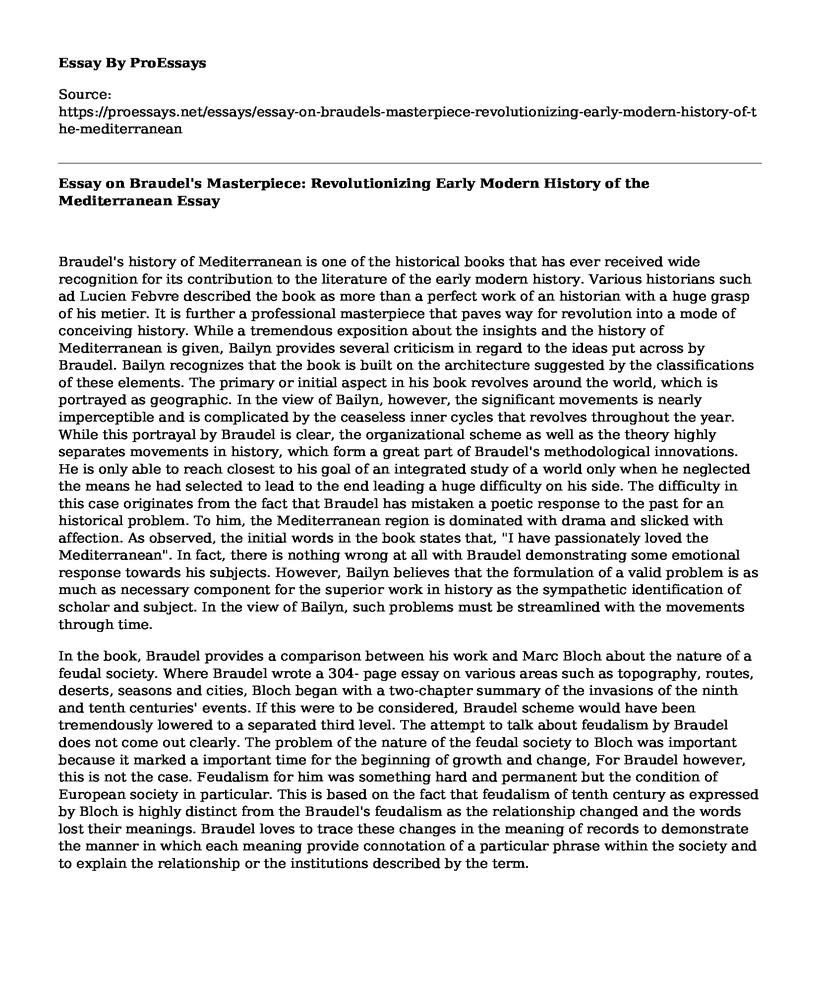Braudel's history of Mediterranean is one of the historical books that has ever received wide recognition for its contribution to the literature of the early modern history. Various historians such ad Lucien Febvre described the book as more than a perfect work of an historian with a huge grasp of his metier. It is further a professional masterpiece that paves way for revolution into a mode of conceiving history. While a tremendous exposition about the insights and the history of Mediterranean is given, Bailyn provides several criticism in regard to the ideas put across by Braudel. Bailyn recognizes that the book is built on the architecture suggested by the classifications of these elements. The primary or initial aspect in his book revolves around the world, which is portrayed as geographic. In the view of Bailyn, however, the significant movements is nearly imperceptible and is complicated by the ceaseless inner cycles that revolves throughout the year. While this portrayal by Braudel is clear, the organizational scheme as well as the theory highly separates movements in history, which form a great part of Braudel's methodological innovations. He is only able to reach closest to his goal of an integrated study of a world only when he neglected the means he had selected to lead to the end leading a huge difficulty on his side. The difficulty in this case originates from the fact that Braudel has mistaken a poetic response to the past for an historical problem. To him, the Mediterranean region is dominated with drama and slicked with affection. As observed, the initial words in the book states that, "I have passionately loved the Mediterranean". In fact, there is nothing wrong at all with Braudel demonstrating some emotional response towards his subjects. However, Bailyn believes that the formulation of a valid problem is as much as necessary component for the superior work in history as the sympathetic identification of scholar and subject. In the view of Bailyn, such problems must be streamlined with the movements through time.
In the book, Braudel provides a comparison between his work and Marc Bloch about the nature of a feudal society. Where Braudel wrote a 304- page essay on various areas such as topography, routes, deserts, seasons and cities, Bloch began with a two-chapter summary of the invasions of the ninth and tenth centuries' events. If this were to be considered, Braudel scheme would have been tremendously lowered to a separated third level. The attempt to talk about feudalism by Braudel does not come out clearly. The problem of the nature of the feudal society to Bloch was important because it marked a important time for the beginning of growth and change, For Braudel however, this is not the case. Feudalism for him was something hard and permanent but the condition of European society in particular. This is based on the fact that feudalism of tenth century as expressed by Bloch is highly distinct from the Braudel's feudalism as the relationship changed and the words lost their meanings. Braudel loves to trace these changes in the meaning of records to demonstrate the manner in which each meaning provide connotation of a particular phrase within the society and to explain the relationship or the institutions described by the term.
Cite this page
Essay on Braudel's Masterpiece: Revolutionizing Early Modern History of the Mediterranean. (2023, Jan 02). Retrieved from https://proessays.net/essays/essay-on-braudels-masterpiece-revolutionizing-early-modern-history-of-the-mediterranean
If you are the original author of this essay and no longer wish to have it published on the ProEssays website, please click below to request its removal:
- Romeo and Juliet Annotated Bibliography
- Explication of the Poem "A Blessing" by James Wright Essay
- The Ursulines Paper Example
- King Lear Essay Example
- Visual Art Renaissance Essay Example
- Similarities of Beowulf, Hamlet, Things Fall Apart, and The Things They Carried
- 1984: Government Control, Rebellion, and Human Nature - Book Analysis Essay







